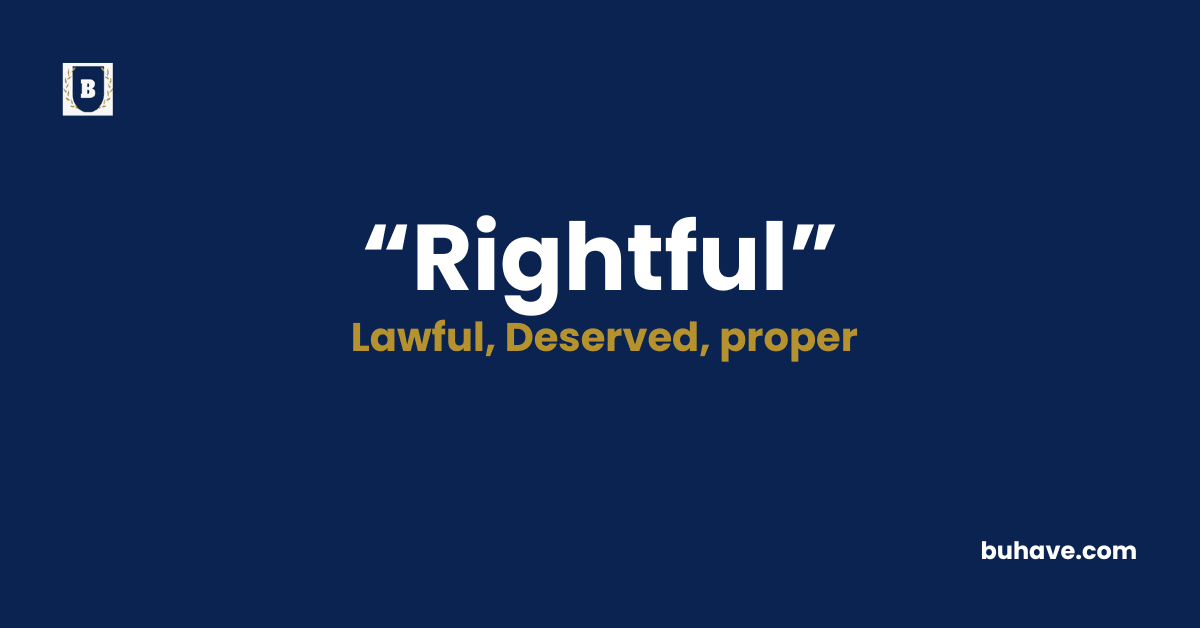The word ‘Rightful’ (Adjective) refers to something that is morally or legally correct, proper, or just. It suggests entitlement to a position, object, or action based on fairness, law, or natural justice. In this guide, you’ll discover the full meaning, expanded definition, fascinating etymology, helpful examples, synonyms, antonyms, and frequently asked questions to understand and use “Rightful” accurately in both formal and casual contexts.
Rightful Explained in Depth
A complete and detailed guide to the words Rightful including meaning, definition, examples, etymology, synonyms, and antonyms.
Meanings of Rightful
Rightful is used to describe something that is deserved, legitimate, or in accordance with by justice, morality, or established laws. When someone refers to a “rightful owner,” they’re talking about the person who legally or ethically deserves something. The term can also describe actions, roles, or claims that are just and proper.
This word carries a strong sense of fairness and correctness. For example, if a king reclaims his throne after being exiled, he might be called the “rightful ruler,” implying that he has a just claim to that position. It also appears in personal contexts: someone might demand their “rightful share” of an inheritance, meaning the portion they’re fairly entitled to receive.
Definition
Rightful combines the concept of legal legitimacy with ethical fairness, making it particularly useful in legal, historical, moral, and even emotional discussions. Whether you’re referring to justice in a courtroom, fairness in a family, or correctness in a moral decision, “rightful” conveys integrity and validity.
It is used to affirm that something belongs to someone or should happen a certain way based on justice, law, or natural entitlement.
Etymology
The word “rightful” is derived from the root word “right,” which traces back to Old English riht, meaning “just, good, fair, proper, or correct.” This Old English term comes from the Proto-Germanic *rekhtaz, and ultimately from the Latin word rectus, which also means “straight” or “right” (as in morally upright or correct).
The suffix “-ful” was added in Middle English to form “rightful,” creating a descriptive adjective meaning “full of right” or “characterized by justice and fairness.” So etymologically, “rightful” literally means “full of what is right.” Over the centuries, it became commonly used to describe claims, actions, and identities that are validated by moral or legal standards.
Its usage has remained steady in legal and literary contexts, often emphasizing legitimacy, fairness, and moral authority. From Shakespeare’s use of “rightful heir” to legal arguments in modern courts, “rightful” preserves its power to express justice and proper entitlement.
Example Sentences
- He is the rightful heir to the throne, according to the royal bloodline.
- She demanded her rightful place in the discussion, having worked on the project since the beginning.
- The court ruled in favor of the rightful owner of the stolen artwork.
- They finally received the rightful recognition for their efforts in the community.
- It’s only fair that she be treated as the rightful winner of the contest.
Rightful Synonyms
- Legitimate
- Just
- Deserved
- Entitled
- Lawful
- Honest
- True
- Valid
- Proper
- Fair
Rightful Antonyms
- Unjust
- Illegitimate
- Wrongful
- Unlawful
- Improper
- Undeserved
- False
- Dishonest
- Invalid
- Inappropriate
FAQs about Rightful
Here are some frequently asked questions (FAQs) about the word “Rightful”
1. What does “rightful” mean in a legal context?
In legal terms, “rightful” refers to someone or something that has a legitimate claim under the law—such as a rightful owner or rightful heir. It confirms that their claim is supported by legal evidence or precedent.
2. Is “rightful” always about ownership?
No, it’s broader than that. While it’s often used to describe rightful ownership, it can also refer to rightful actions, roles, or recognition based on fairness or justice—for example, “rightful place” or “rightful decision.”
3. Can “rightful” be used in everyday language?
Yes, though it has a slightly formal tone, it’s still common in everyday use. People say things like, “She took her rightful place on the team,” or “That was his rightful reward.”
4. Is “rightful” the same as “legal”?
Not exactly. “Legal” focuses strictly on the law, while “rightful” can also include moral and ethical dimensions. Something can be legal but not necessarily rightful in a moral sense—and vice versa.
5. What’s the opposite of “rightful”?
Common antonyms include “wrongful,” “illegitimate,” “unjust,” and “undeserved.” These words imply that the claim or action lacks fairness, legal backing, or moral correctness.
Explore More R Words
- Positive words that start with R
- Adjectives starting with R
- Negative words that start with R
- Nouns that start with R
- Verbs that start with R

